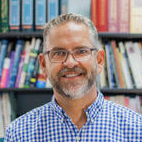“I’d like to chat with you about your sermon,” she said.
We walked together to a quiet place and I sat down next to her, curious and a bit anxious.
“You said that God is secure.”
Indeed, I’d said it. A few times.
“I’ve always had this sense that God is a little off-kilter,” she said…”kind of angry and yet scrambling to get his children in line, a bit abusive at times but trying to make up for it with kindness.”
We sat silently for 30 seconds or so, her eyes filled with tears, mine starting to tear up.
She’d heard me say God is always home in the sermon. God, who is father but also mother in Luke 15, is home while the younger son ventures out indulgently and avoidantly. But, as the story shows, the older son does not “remain,” does not “abide” either. His anxious and resentful disposition doesn’t allow him to receive the father’s love, the mother’s embrace. In the end, the father must go out twice – once to greet the younger son, and another time to find the lost elder son.
“God seems so good in this story,” she said. “So relaxed. So at ease. Patient. Probably sad, but so willing to wait. It’s hard to believe.”
“There is a lot that happens in our own lives that conspires to breed doubt and suspicion and disbelief,” I said. “I feel it every day. That’s why I need this story.”
Somewhere in my theological training I must have missed the attribute of “God’s security.” It’s got to be in there, alongside omniscience and omnipresence and all the rest.
God is secure.
 Like a secure parent, who isn’t thrown to-and-fro by the moods of her child, who is able to hold the cries and the laughs, the bitter disappointments and the glorious ecstasies of her beloved child.
Like a secure parent, who isn’t thrown to-and-fro by the moods of her child, who is able to hold the cries and the laughs, the bitter disappointments and the glorious ecstasies of her beloved child.
Like a secure parent, whose anger is never reactive, whose love is never co-dependent or manipulative.
Like a secure parent, who holds his bullied middle schooler while he cries or comforts her scraped up daughter after a spill on her bike.
Like a secure parent, who can weather the storms of a teenage rebellion. Or navigate the perfectionism that breeds anxiety and exhaustion. Or say goodbye to his child when it’s time.
Like a secure parent, who ventures to the margins to rescue and redeem, who bears the shame so that we do not have to.
Like a secure parent.
God is so very secure, able to hold the paradoxes, the tensions, the pain of his children.

God is secure. When I’m anxious. When I’m afraid. When I sabotage.
St. Augustine once said:
Late have I loved you,
Beauty so ancient and so new,
late have I loved you!
Lo, you were within,
but I outside, seeking there for you,
and upon the shapely things you have made
I rushed headlong – I, misshapen.
You were with me, but I was not with you.
They held me back far from you,
those things which would have no being,
were they not in you.
God remains, even when we do not. God abides when we do not. And I breathe just a little bit easier.

